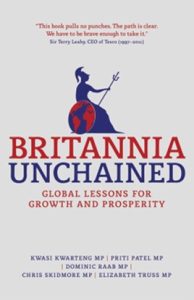“I will deliver a bold plan to cut taxes and grow our economy.” This was her bold announcement as Liz Truss won the leadership race for the Conservative Party and subsequently became the Prime Minister of Britain. She elected Kwasi Kwarteng as the Chancellor of the Exchequer, through whom she executed her “bold plan.” So why was Kwasi Kwarteng sacked, who was primarily following the orders of Truss? The answer is multifaceted.
The Background
The Debacle of the Mini Budget Announced by Kwasi Kwarteng
Soon after Liz Truss became the Prime Minister of the UK in September, the Chancellor, Kwasi Kwarteng, delivered the mini budget that saw huge tax cuts, the freezing of the energy price cap for two years, and the reversal of the increase in National Insurance. Corporations were delighted as the decision to increase corporation tax was scrapped, while the rich people heaved a sigh of relief thanks to the abolition of the 45% income tax on income over £150,000.
This mini-budget of Kwasi Kwarteng was widely criticized from almost all quarters. Even the IMF, which usually retains a neutral stance on the activities of sovereign governments, criticized such huge tax cuts and concessions. Every stakeholder (apart from the rich and the corporations) believed that such a generous budget would damage the economy in the long run and lead to excessive borrowing and wealth disparity.
But the biggest impact of the budget was on the gilt market. People were spooked and started selling their bonds. If more and more people start selling bonds, the interest rate can rise significantly, leading to more financial bleeding for the government. The value of GBP too fell sharply. Ultimately, the Bank of England had to step in and buy the excess bonds from the market to keep the interest rates stable and also to avoid the collapse of the pension fund.
Ultimately, on October 14, Liz Truss sacked the Kwasi Kwarteng.
Shifting the Blame?
You have to understand the fact that although the initial promises made by Liz Truss were taken well by the Tories, the unilateral way with which she and the Chancellor delivered the mini-budget was hard to digest for the party members.
Along with the above fact, remember that Lizz Truss did not have a resounding win during the run-up for the post of the UK Prime Minister. Yes, she did win, but she got less than 60% votes from the Conservative party members, while the Tory MPs clearly were more in support of Rishi Sunak.
Hence, after the mini-budget debacle, she needed to defend her leadership position in the party. It was easy for Truss to put the blame for coming up with a disastrous budget entirely on the former Chancellor. Her decision to sack Mr. Kwarteng is being seen as an effort to placate the Conservative party members.
A section of the internet population is arguing that it might be possible that Kwasi was, in fact, the chief architect of the mini-budget and Lizz Truss just accepted the decision of her Chancellor. This argument seems baseless since Liz Truss and Kwasi Kwarteng co-authored a book named Britannia Unchained with the same agenda of easing the tax burden and excessive regulation as its theme. Hence, they both share the same ideology.

The Reason Behind Choosing Jeremy Hunt as the New Chancellor by Liz Truss
As we said, Rishi Sunak was more popular among the Conservative MPs. And Jeremy Hunt is a more, let’s say, pure Conservative party worker who appeals to the traditional supporters.
Hence, Liz Truss wanted to kill two birds with one stone by replacing Kwasi with Jeremy Hunt. On the one hand, she wanted to go back into the good books of the Conservative party by appointing someone who, the party member knew, would toe the party’s line. On the other hand, Jeremy Hunt backed Rishi Sunak during his campaign for Prime Ministership. Hence, by appointing Hunt, she wanted to receive at least a fraction of a favorable view from the MPs who supported Sunak.
The Way Forward
As this news piece was being written, Jeremy Hunt announced that the government would reverse “almost all” tax cuts announced in the mini-budget that Kwasi Kwarteng delivered.
The story of Kwasi Kwarteng is over. It is to be seen how Liz Truss conserves her relevance as the Conservative party leader. Meanwhile, ordinary Britons are not very optimistic about Jeremy Hunt given that as the former Health Secretary, Jeremy Hunt’s policies negatively impacted the NHS. The upheaval in the British political scene is yet to conclude.

















